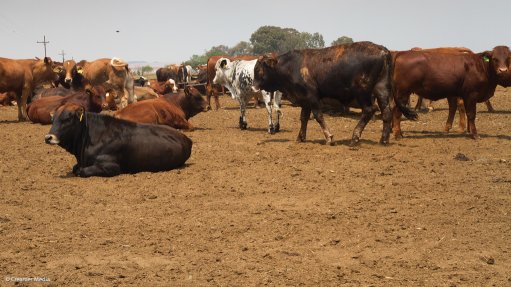Department outlines pre-emptive measures amid forecasts of deteriorating water supply
While South Africa is currently in balance nationally in terms of water supply and demand, albeit with localised – and, in some cases, severe – deficits, this could change rapidly.
The country remains water scarce, and water availability could deteriorate as supply contracts and demand escalates, owing to the impacts of climate change, economic growth, ongoing population growth, urbanisation and inefficient use, including increasing physical losses in municipal distribution systems.
Speaking at the Spanish Chamber of Commerce-hosted Water Management and Sustainable Energy conference, held in Johannesburg in July, Department of Water and Sanitation (DWS) director-general Dr Sean Phillips outlined three measures required to avoid water shortages in the future and the sector becoming a constraint to economic growth.
“We need to build more surface water infrastructure to capture the remaining available surface water. “There are limitations to which that can solve our future problems, as we are already capturing 75% of the available surface water; however, we need to put in the infrastructure to capture the remaining 25%.”
While delays in the implementation of surface water resource development projects in the past have now been addressed to accelerate them and further projects to increase surface water will require a significant amount of investment, it will not be sufficient to avoid water shortages in the future.
“We also need to diversify the water mix. We need to increase sustainable use of groundwater. We are also going to increasingly need to get our coastal cities to add much more seawater desalination and we need much more water reuse, particularly in our metropolitan areas,” he said.
In addition, as supply-side measures are not sufficient to avoid future water deficits, there is a need for effective water conservation and water demand management (WCWDM).
WCWDM must also be implemented, particularly in domestic and general industrial use, by reducing physical losses in municipal distribution systems and instilling water-saving behaviour to reduce the above-average consumption per capita consumption of water.
“If we do not do all three of these things, if we do not diversify the water mix, if we do not build the existing surface-water-capturing infrastructure and if we do not make our water use more efficient, we will have water shortages in the future and water will be a constraint to growth,” he warned.
Further, it is important for South Africa to get the basics right.
Internationally, there is significant focus on water challenges related to climate change. While also an important focus for South Africa, the country continues to face critical basic and institutional challenges that need deeper focus.
“People do not have water or the water does not meet the quality standards, or people do not have reliable sources of water. We have serious problems with our wastewater treatment systems in South Africa,” said Phillips.
The countrty’s deteriorating water quality and supply reliability are increasingly in focus following the failure of some municipalities to provide reliable and clean water.
The DWS’s Blue and Green Drop reports show that many water supply systems and wastewater treatment plants do not meet the required quality standards.
Inefficiencies in the speed and quality of repairing leaks and burst pipes, as well as vandalism, the non-implementation of water efficiency solutions, and unplanned human settlement resulting in unmetered water consumption, contributed to the challenge of water losses
Further exacerbating failures in the supply of water is loadshedding, which is impacting on bulk water treatment, storage and distribution.
In addition, low financial investment by municipalities in water services projects, such as storage reservoirs, pumpstations, towers and old pipe renewals or upgrades, is undermining water infrastructure.
Centre for Risk Analysis head of policy analysis Chris Hattingh said that government cannot fix the situation overnight – nor can it fix it at all on its own.
Article Enquiry
Email Article
Save Article
Feedback
To advertise email advertising@creamermedia.co.za or click here
Press Office
Announcements
What's On
Subscribe to improve your user experience...
Option 1 (equivalent of R125 a month):
Receive a weekly copy of Creamer Media's Engineering News & Mining Weekly magazine
(print copy for those in South Africa and e-magazine for those outside of South Africa)
Receive daily email newsletters
Access to full search results
Access archive of magazine back copies
Access to Projects in Progress
Access to ONE Research Report of your choice in PDF format
Option 2 (equivalent of R375 a month):
All benefits from Option 1
PLUS
Access to Creamer Media's Research Channel Africa for ALL Research Reports, in PDF format, on various industrial and mining sectors
including Electricity; Water; Energy Transition; Hydrogen; Roads, Rail and Ports; Coal; Gold; Platinum; Battery Metals; etc.
Already a subscriber?
Forgotten your password?
Receive weekly copy of Creamer Media's Engineering News & Mining Weekly magazine (print copy for those in South Africa and e-magazine for those outside of South Africa)
➕
Recieve daily email newsletters
➕
Access to full search results
➕
Access archive of magazine back copies
➕
Access to Projects in Progress
➕
Access to ONE Research Report of your choice in PDF format
RESEARCH CHANNEL AFRICA
R4500 (equivalent of R375 a month)
SUBSCRIBEAll benefits from Option 1
➕
Access to Creamer Media's Research Channel Africa for ALL Research Reports on various industrial and mining sectors, in PDF format, including on:
Electricity
➕
Water
➕
Energy Transition
➕
Hydrogen
➕
Roads, Rail and Ports
➕
Coal
➕
Gold
➕
Platinum
➕
Battery Metals
➕
etc.
Receive all benefits from Option 1 or Option 2 delivered to numerous people at your company
➕
Multiple User names and Passwords for simultaneous log-ins
➕
Intranet integration access to all in your organisation


















